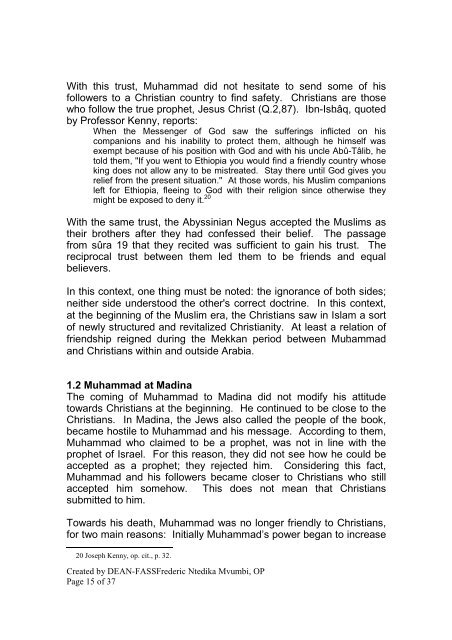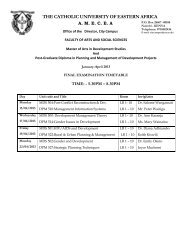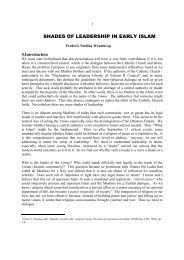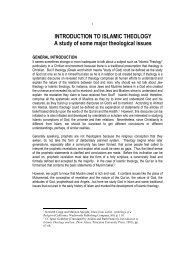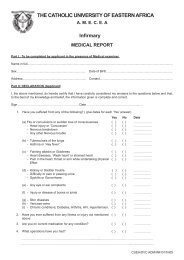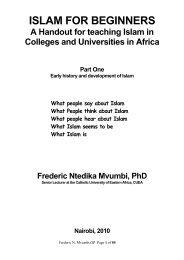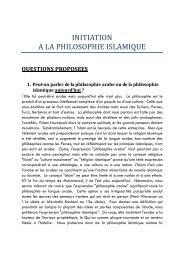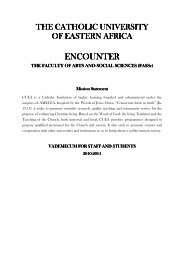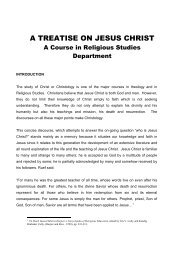PRINCIPLES FOR INTERRELIGIOUS DIALOGUE.pdf - CUEA
PRINCIPLES FOR INTERRELIGIOUS DIALOGUE.pdf - CUEA
PRINCIPLES FOR INTERRELIGIOUS DIALOGUE.pdf - CUEA
You also want an ePaper? Increase the reach of your titles
YUMPU automatically turns print PDFs into web optimized ePapers that Google loves.
With this trust, Muhammad did not hesitate to send some of his<br />
followers to a Christian country to find safety. Christians are those<br />
who follow the true prophet, Jesus Christ (Q.2,87). Ibn-Is .hâq, quoted<br />
by Professor Kenny, reports:<br />
When the Messenger of God saw the sufferings inflicted on his<br />
companions and his inability to protect them, although he himself was<br />
exempt because of his position with God and with his uncle Abû- .Tâlib, he<br />
told them, "If you went to Ethiopia you would find a friendly country whose<br />
king does not allow any to be mistreated. Stay there until God gives you<br />
relief from the present situation." At those words, his Muslim companions<br />
left for Ethiopia, fleeing to God with their religion since otherwise they<br />
might be exposed to deny it. 20<br />
With the same trust, the Abyssinian Negus accepted the Muslims as<br />
their brothers after they had confessed their belief. The passage<br />
from sûra 19 that they recited was sufficient to gain his trust. The<br />
reciprocal trust between them led them to be friends and equal<br />
believers.<br />
In this context, one thing must be noted: the ignorance of both sides;<br />
neither side understood the other's correct doctrine. In this context,<br />
at the beginning of the Muslim era, the Christians saw in Islam a sort<br />
of newly structured and revitalized Christianity. At least a relation of<br />
friendship reigned during the Mekkan period between Mu .hammad<br />
and Christians within and outside Arabia.<br />
1.2 Muhammad at Madina<br />
The coming of Muhammad to Madina did not modify his attitude<br />
towards Christians at the beginning. He continued to be close to the<br />
Christians. In Madina, the Jews also called the people of the book,<br />
became hostile to Muhammad and his message. According to them,<br />
Muhammad who claimed to be a prophet, was not in line with the<br />
prophet of Israel. For this reason, they did not see how he could be<br />
accepted as a prophet; they rejected him. Considering this fact,<br />
Muhammad and his followers became closer to Christians who still<br />
accepted him somehow. This does not mean that Christians<br />
submitted to him.<br />
Towards his death, Muhammad was no longer friendly to Christians,<br />
for two main reasons: Initially Muhammad’s power began to increase<br />
20 Joseph Kenny, op. cit., p. 32.<br />
Created by DEAN-FASSFrederic Ntedika Mvumbi, OP<br />
Page 15 of 37


